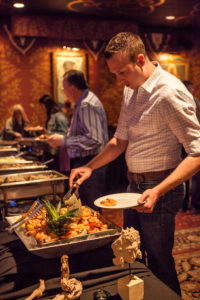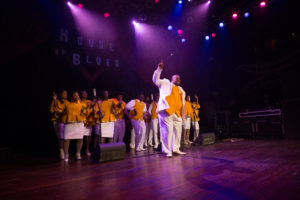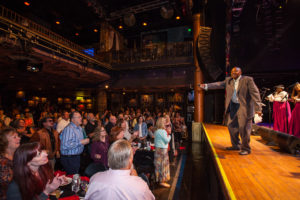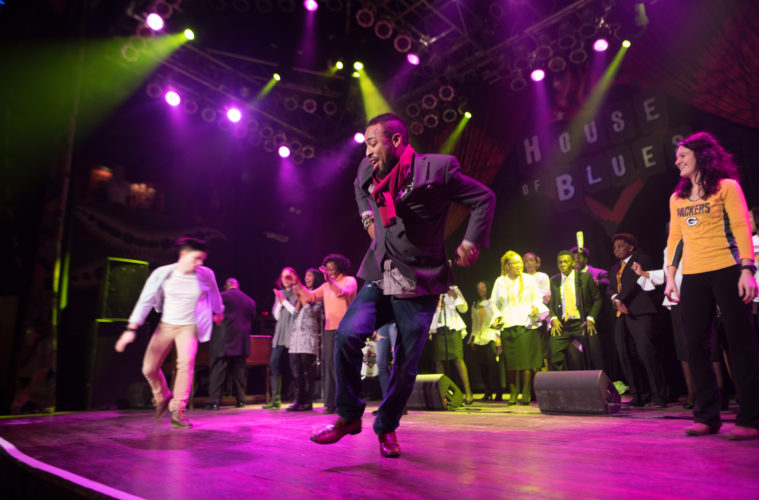As you learn in the introductory video at Gospel Brunch at the House of Blues Anaheim, the Biblical music genre has unique roots. Dan Aykroyd, co-star of Blues Brothers and co-founder of the House of Blues chain, narrates the short film to a background of scraping forks and humming mouths. He describes the history of Gospel as a cousin to the Blues – begun by African-Americans who used it to cope with the reality of living in a country that once enslaved them. A history of shared trauma united them and Gospel music lifted them up.
Music moves us because it is art and because it makes us reckon with our senses. When it is coupled with exuberant hymns, it can ignite a live audience.

Photo Courtesy of House of Blues Entertainment
Congregational worship is a community effort, especially among majority-Black parishes across the South. This is a stark contrast to the Mass services that are associated with majority-white, European-based sects of Christianity, where speaking out of turn is considered shameful.
When I visited the show at the House of Blues was a more mixed affair, where tourists dressed to hit Disneyland later in the day mingled with other attendees in their Sunday best. Everyone picked at the buffet that surrounded the seating arrangements. The entire setup was a rather intimate affair, where the upper level and most seats in the back were cordoned off. Only a few dining-hall-style tables were set up directly in front of the stage, where a few dozen people were seated.

Photo Courtesy of House of Blues Entertainment
Sharing a meal is not insignificant. As we have learned from wise men like Jonathan Gold, “food is a way to look at the world.” When we come together for brunch, we have a connection, no matter how brief or untenable. We sing the same songs and breathe the same air. We share the same problems, like when biscuits run out before sopping up all of the gravy. We rearrange our seating arrangements to ensure that everyone can sit together. We care.
The venue allowed everyone ample time to get situated with their food, and some even had time to go for seconds before the show started. A projector screen retracted into the ceiling after Aykroyd’s spiel, and the velvet curtains unfurled to reveal a lively 11-piece band that had already begun playing. When not onstage at the House of Blues, the band is known as Ray Sidney and the Firm Soundation, led by a charismatic bandleader.

Photo Courtesy of House of Blues Entertainment
They are an international phenomenon. The Firm Soundation has connections to Japan and Korea, where evangelical Christian movements have taken hold since the advent of – and this is true – the 1991 film “Sister Act 2,” starring Whoopi Goldberg. They call their congregation Here To Praise Ministry, and they are part of the Hallelujah Gospel Family choir network of Japan. The Firm Soundation will be touring in eastern Asia starting in mid-November, spending most of Advent overseas with relatively new believers.

Photo Courtesy of House of Blues Entertainment
As Sidney introduced Gospel Brunch, he promised many diverse styles of music, not limited to what we know as Gospel. Their choir of seven people would bring their a cappella prowess to just about every number. And except for a few traditional spirituals, few songs were explicitly about worship. The symbols along the walls – of a crescent moon and star, the Hamsa Hand, Star of David, yin and yang – demonstrated the band’s dedication to unity in diversity.
Though the crowd was sleepy at the start of the show, everyone played along with the clapping, towel snapping and group singing. The band pulled onto stage anyone celebrating a birthday or anniversary, making for a surprisingly lively dance party. In our house, everyone celebrates like it is their final day.

Photo Courtesy of House of Blues Entertainment
Popular music and Gospel do not traditionally have any overlap. But the band smartly borrowed some of the most familiar classics that feature messages of faith. “Amazing Grace” is considered the most recognizable song in the world, so the choir took a moment without instrumentation to sing the first verse. After Sidney proclaimed us all one family at the House of Blues that morning, a rousing rendition of the Sister Sledge smash hit lifted people from their chairs. A guitar lick from “Don’t Stop Believin’” led us to the full chorus of Journey’s best-known single.
Today, a contemporary form of Gospel has been finding its way to other music charts. Artists like Portland-raised Liz Vice have been courted by niche radio and propelled into the independent music scene due to the composition of their work – notably, not the message. Vice has said that the best compliment she ever got was from a non-believer at one of her performances at a rock club: “You almost made me believe in Jesus.” Hope and beauty work together to drive home messages that some listeners are not prepared for, and that some may need to reckon with later.
Gospel’s history is continuing to be written. There are many directions that the genre has been taken, from hybrid bluegrass to urban-contemporary. Singers do not pursue the genre because they will be world-famous, but because they know it has power. Even those without faith can see that.
Advertising disclosure: We may receive compensation for some of the links in our stories. Thank you for supporting Irvine Weekly and our advertisers.

